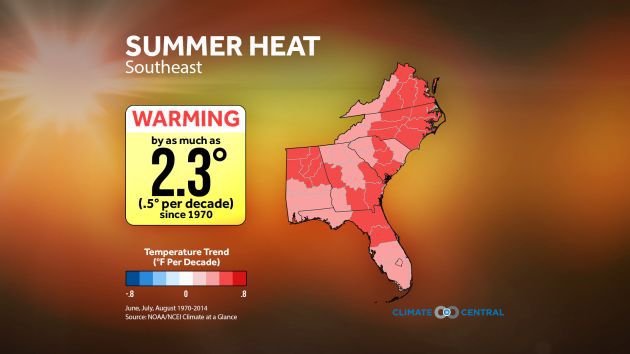There is clear scientific evidence now that Earth is getting warmer. The ten hottest years on the planet have occured since 2000 with the exception of 1998. Two seperate studies from NOAA and NASA have shown that 2014 was the hottest year on the record since 1880. Based on global temperature data from NOAA for the first half of 2015, this year is on the way to being just as hot as 2014 and possibly a little hotter.
If we focus just on this summer in North Carolina, we definitely have felt the heat here. Average temperature data from the Southeast Regional Climate Center for June through the first week of August shows the summer of 2015 in is the top 10 hottest summers on record for several cities:
- Charlotte: 3rd hottest summer on record
- Wilmington: 3rd hottest summer on record
- Greensboro: 4th hottest summer on record
- Raleigh-Durham: 7th hottest summer on record
We were curious how much impact the warming Earth is having on North Carolina summers. With the help of data analysis from Climate Central, it does appear that there is a trend for hotter summers over the last few decades in the state. Climate Central is an independent and non-profit group that researches the changing climate and its impacts on the United States.
Climate Central's research using NOAA temperature data shows that summers are up to 2.3 degrees hotter across the southeastern United States now than in 1970. That is partly due to more days with extreme high temperatures.
There has been a trend in many parts of the southeast for more days with highs of 95 or higher. That trend can clearly be seen for the Raleigh and Durham area since the 1970s. The trend does not appear to be quite as clear for Charlotte and Greensboro, but the number of hotter summer afternoons has been on the rise in much of the state.



It is not just the summer afternoons that are getting hotter. Climate Central's research also shows summer nights are hotter. Overnight temperatures across the state are about 2.5 degrees hotter than the 1970s.

For more weather and climate stories like this one plus forecast updates and weather photos, follow Meteorologist Lee Ringer on Facebook and Twitter.
